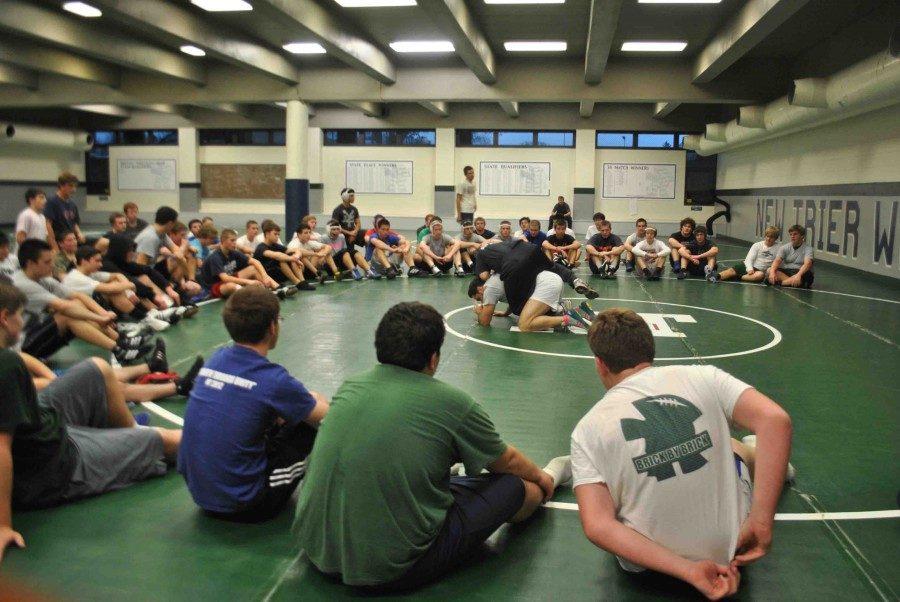Student athletes at risk over weight and nutrition issues
Weight concerns influence nutrition during athletic seasons
March 6, 2017
With the competitive culture rooted in virtually all New Trier sports, being a serious athlete in this township inevitably places an emphasis on the vitality of nutrition.
If athletes are looking to reach peak athleticism, it is essential that their eating habits reflect just that.
Paul Sweetow, a sports psychologist and registered social worker based in Winnetka, said, “As an athlete, our body is the vehicle of our athletic endeavor, and we need to deliver the best possible fuel for the best performance. All athletes, the more competitive they get, will certainly think of food in some way. For sure, every sport is going to require some awareness of nutritional intake, even if they’re not weight driven like rowing or wrestling.”
Although diets are highly personal and customizable, there are general recommendations that serve as the basis of a healthy diet for virtually everyone.
Julie Burns, a sports nutritionist and founder of SportFuel, Inc. said that in terms of diet, “The most important things athletes can do is eat real food. Eat food that will rot and spoil, but eat it before it does. If you’re eating a lot of fresh foods and real foods, you can’t go wrong. Eating fermented foods is also very important. A serving of fermented veggies a day is good for your stomach and your head, as it helps to relieve anxiety and stress.”
For some, being a competitive athlete has been beneficial to their health, as it emphasizes the importance of maintaining a healthy lifestyle.
Senior John McCain said his experience on the varsity lacrosse team taught him to, “Be in good shape so you can do well. It emphasized eating well and being healthy in general.”
While most athletes can echo a similar sentiment, some sports have the added focus of weight as a fundamental part of their competitive rankings.
In wrestling and powerlifting, athletes are divided into weight classes, where they compete against athletes of similar body mass.
In rowing, weighted scores are taken into account, where times from test pieces are calculated as if everyone were to weigh the same. Therefore, if two people have the same raw score, the lighter person has a better weighted score.
Additionally, rowing has a lightweight category that allows people under a certain weight to compete against each other. For obvious reasons, these sports are often more susceptible to negatively impacting the nutritional habits of athletes.
However, weight itself should not be a top priority for athletes striving to seize their athletic potential.
Coach Jim Davis said that in virtually all sports, “There’s this idea that if you’re at a certain weight, you’re gonna perform better. That’s an invented thing. It’s good to have goals, but health and performance far outweigh anything you might see on the scale. There’s no doubt about that.”
Varsity wrestling coach Tade Kemnitz said because of the importance of weight classes, “Often wrestlers are obsessed with food. If you restrict intake, then you are more likely to binge and over-indulge.”
Burns added that “Athletes who are more concerned about their appearance, like gymnasts, and athletes that need to make weight are definitely more susceptible to disordered eating, and even eating disorders.”
Because of the surreptitious nature that eating disorders can have, their prevalence in weight-focused sports can be swept under the rug.
Senior Eden Rane said that on the rowing team, she has seen a fixation with weight pave the way to unhealthy eating habits.
“It’s scary and sad but I’ve seen it. Sometimes, a few rowers can obsess over it so much and they don’t even know what they are doing to themselves. It’s one of those disorders where you think you’re doing the right thing but in reality, you’re really depriving yourself,” said Rane.
However, it is important to note that the development of eating disorders expands past the emphasis that a sport may place on weight.
Paul Sweetow said, “A lot of issues with eating disorders are deep psychological issues and not sport performance related.”
Burns added that when combating eating disorders, it takes a lot more than just altering one’s diet. “A lot of times people think it’s just about the food. But really it’s about a lot of other things with therapists, psychologists, psychiatrists, and nutritionists. Therefore, when combating an eating disorder, a team approach with all of these different parts is really the most effective course of action.”













































